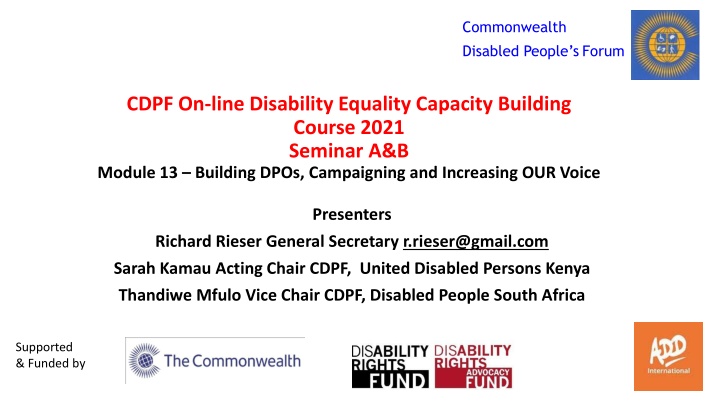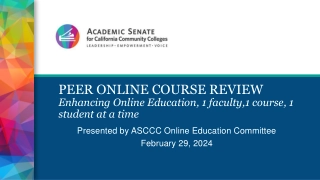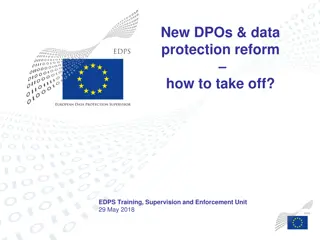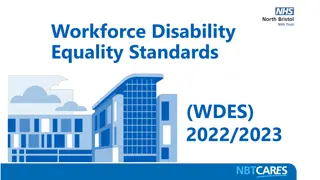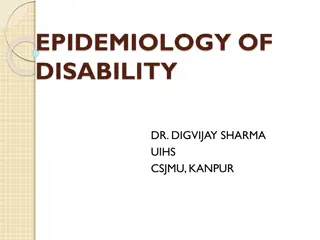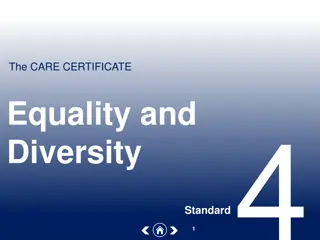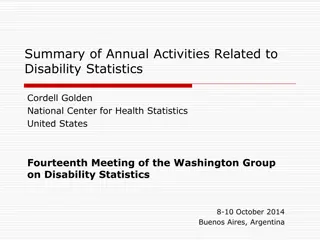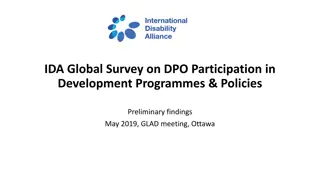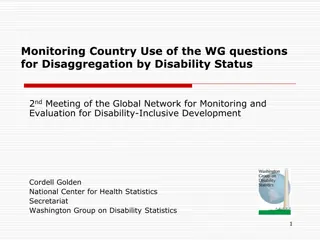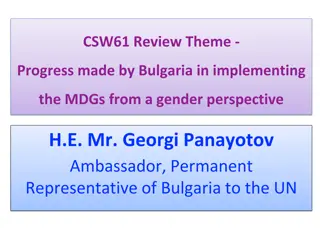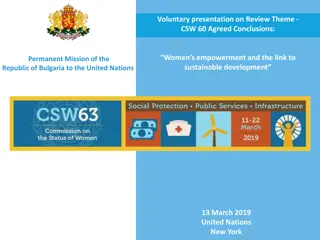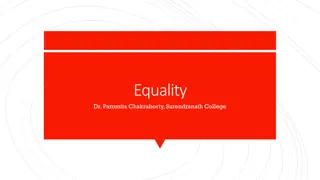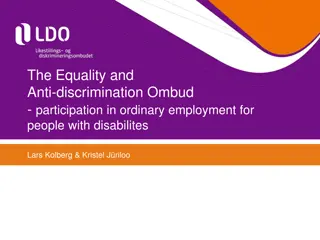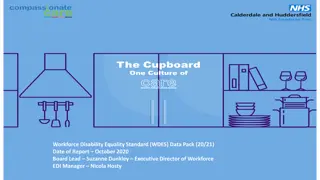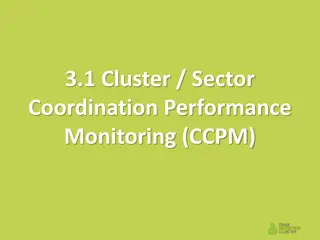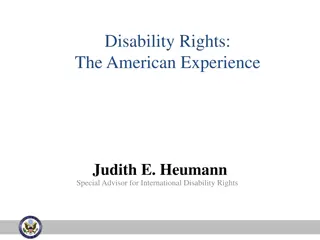Online Disability Equality Capacity Building Course 2021: Building DPOs
Organizations of persons with disabilities (DPOs) play a crucial role in advocating for the rights of individuals with disabilities. Led, directed, and governed by persons with disabilities, DPOs are rooted in promoting and defending disability rights. They represent diverse backgrounds and work independently from political affiliations. DPOs are instrumental in providing a collaborative voice for persons with disabilities at local, national, and international levels.
Download Presentation

Please find below an Image/Link to download the presentation.
The content on the website is provided AS IS for your information and personal use only. It may not be sold, licensed, or shared on other websites without obtaining consent from the author.If you encounter any issues during the download, it is possible that the publisher has removed the file from their server.
You are allowed to download the files provided on this website for personal or commercial use, subject to the condition that they are used lawfully. All files are the property of their respective owners.
The content on the website is provided AS IS for your information and personal use only. It may not be sold, licensed, or shared on other websites without obtaining consent from the author.
E N D
Presentation Transcript
Commonwealth Disabled People sForum CDPF On-line Disability Equality Capacity Building Course 2021 Seminar A&B Module 13 Building DPOs, Campaigning and Increasing OUR Voice Presenters Richard Rieser General Secretary r.rieser@gmail.com Sarah Kamau Acting Chair CDPF, United Disabled Persons Kenya Thandiwe Mfulo Vice Chair CDPF, Disabled People South Africa Supported & Funded by
Definition of Disabled Peoples Organisations DPOs Definition of Disabled People s Organisations DPOs /Organisations of Persons with Disabilities OPD /Organisations of Persons with Disabilities OPD The (UNCRPD )Committee considers that organizations of persons with disabilities (Disabled People s Organisations) :-should be rooted, committed to and fully respect the principles and rights recognized in the Convention. :-They can only be those that are led, directed and governed by persons with disabilities. :-A clear majority of their membership should be recruited among persons with disabilities themselves. Organizations of women with disabilities, children with disabilities and persons living with HIV/AIDS are organizations of persons with disabilities under the Convention. (UNCRPD General Comment No 7.para.11)
1. Organizations of persons with disabilities (DPOs) have certain characteristic aspects, including that: (a) They are established predominantly with the aim of collectively acting, expressing, promoting, pursuing and/or defending the rights of persons with disabilities and should be generally recognized as such; (b) They employ, are represented by, entrust or specifically nominate/appoint persons with disabilities themselves; (c) They are not affiliated, in the majority of cases, to any political party and are independent from public authorities and any other non-governmental organizations of which they might be part/members of; (d) or can be open to membership of all persons with disabilities; They may represent one or more constituencies based on actual or perceived impairment
2. Organizations of persons with disabilities have certain characteristic aspects, including that: e) They represent groups of persons with disabilities reflecting the diversity of their backgrounds (in terms of, for example, sex, gender, race, age, or migrant or refugee status). They can include constituencies based on transversal identities (for example, children, women or indigenous people with disabilities) and comprise members with various impairments; (f) They can be local, national, regional or international in scope; (g) They can operate as individual organizations, coalitions or cross-disability or umbrella organizations of persons with disabilities, seeking to provide a collaborative and coordinated voice for persons with disabilities in their interactions with, among others, public authorities, international organizations and private entities. UNCRPD Committee General Comment no 7 Para.11 https://tbinternet.ohchr.org/_layouts/treatybodyexternal/Download.aspx?symbolno=CRPD/C/GC/7&Lang=en
Distinction between organizations of persons with disabilities (OPDs) or alternatively Disabled People s Organisations DPOs and other civil society organizations UNCRPD Gen Comment No 7 (2018) Organizations of persons with disabilities (OPDs) or alternatively Disabled People s Organisations DPOs should be distinguished from organizations for persons with disabilities, which provide services and/or advocate on behalf of persons with disabilities, which, in practice, may result in a conflict of interests in which such organizations prioritize their purpose as private entities over the rights of persons with disabilities. States parties should give particular importance to the views of persons with disabilities, through their representative organizations, support the capacity and empowerment of such organizations and ensure that priority is given to ascertaining their views in decision- making processes. ( Para 13)
A distinction should also be made between organizations of persons with disabilities and civil society organizations. The term civil society organization comprises different kinds of organizations, including research organizations/institutes, organizations of service providers and other private stakeholders. Organizations of persons with disabilities (DPOs) are a specific type of civil society organization. They may be part of a mainstream umbrella civil society organization and/or coalitions that do not necessarily advocate specifically for the rights of persons with disabilities, but can support in mainstreaming their rights in the human rights agenda. In accordance with article 33 (3), all civil society organizations, including organizations of persons with disabilities (DPOs), have a role to play in monitoring the Convention. States parties should give priority to the views of organizations of persons with disabilities (DPOs) when addressing issues related to persons with disabilities, and develop frameworks to request civil society organizations and other stakeholders to consult and involve organizations of persons with disabilities (DPOs) in their work related to the rights enshrined in the Convention and other topics, such as non-discrimination, peace and environmental rights. Para 13
Organisations the UNCRPD Committee Organisations the UNCRPD Committee identifies as OPDs/DPOs identifies as OPDs/DPOs a) Umbrella Organisations of representative DPOs b) Cross Disability Organisations of all individuals with some or all impairments c) Self Advocacy Organisations local, often prevented forming a formal organisation d) Organisations including family members and/or relatives of persons with disabilities e) Organisations of women and girls with disabilities f) Organisations and initiatives of children and young persons with disabilities Para 12 Gen Comment No 7
Clarifying Organisations with Family members Clarifying Organisations with Family members Organizations including family members and/or relatives of persons with disabilities, which are pivotal in facilitating, promoting and securing the interests and supporting the autonomy and active participation of their relatives with intellectual disabilities, dementia and/or children with disabilities, when these groups of persons with disabilities want to be supported by their families as united networks or organizations. In such cases, these organizations should be included in consultation, decision-making and monitoring processes. The role of parents, relatives and caregivers in such organizations should be to assist and empower persons with disabilities to have a voice and take full control of their own lives. Such organizations should actively work to promote and use supported decision-making processes to ensure and respect the right of persons with disabilities to be consulted and to express their own views. Para.13
Activity 1 Activity 1- -Which is a DPO/OPD and Why? Which is a DPO/OPD and Why? 1. A national charitable foundation that provides mobility aids and training. The Board is made up of the founding wheelchair user and 4 non-disabled professionals. 2. A local self advocacy group of adults with learning difficulties who have supported decision making to plan their campaigns. 3. A national charity for people with autism and their families. The Board is made up of non-disabled adults who plan activities for the members. 4. A national umbrella organisation of DPOs, representing people with different impairments, each of which is run and controlled by disabled people as is the Board of the umbrella DPO. 5. An Alliance for Inclusive Education of teachers, parents, disabled children and their non disabled peers. The Board is elected at the AGM and categories of membership ensure a majority of disabled people.
Activity 2 Which organisation is a DPO/ODP Activity 2 Which organisation is a DPO/ODP a) The UNCRPD Conference of State Parties. b) The World Federation of the Deaf c) The European Disability Forum d) The UNCRPD Committee e) Leonard Cheshire International f) The International Disability Development Consortium g) The International Disability Alliance h) The Commonwealth Disabled People s Forum i) Inclusion International j) Action on Disability and Development International
Disability as an individual/medical problem Disability as an individual/medical problem Most non-disabled people, especially doctors and disability professionals, think disability is an individual's problem. People think we are limited in what we can do, because we are not 'the same' as the rest of society. This is often called the 'medical model' of disability. It has been around for a long time. Example: If someone who uses a wheelchair cannot get upstairs to a meeting, people blame the wheelchair, and not the stairs.
Disability as society's problem Disability as society's problem- -an oppression with Social/Human Rights solutions with Social/Human Rights solutions an oppression The Disabled People's Movement has developed a very different way of looking at disability. We have learnt that disability is not caused by us - it is caused by society. This is often called the 'social model' of disability. What stops us is the fact that we live in a world which ignores our needs - for access, understanding, transport, education, employment. Example:The building was built with no lift, and the people organising the meeting didn't move it to a ground floor room.
DEFINITIONS Impairment is the loss or limitation of physical, mental or sensory function on a long-term and permanent basis. Disablement is the loss or limitation of opportunities to take part in the normal life of the community on an equal level with others due to physical and social barriers. Disabled People s International, 1981
UNCRPD Who Are People with Disabilities? UNCRPD Who Are People with Disabilities? Article 1 Purpose The purpose of the present Convention is to promote, protect and ensure the full and equal enjoyment of all human rights and fundamental freedoms by all persons with disabilities, and to promote respect for their inherent dignity. Preamble(d) UNCRPD Recognizing that disability is an evolving concept and that disability results from the interaction between persons with impairments and attitudinal and environmental barriers that hinders their full and effective participation in society on an equal basis with others, Article 1 Purpose UNCRPD Persons with disabilities include those who have long-term physical, mental, intellectual or sensory impairments which in interaction with various barriers may hinder their full and effective participation in society on an equal basis with others. UN Enable website http://www.un.org/disabilities/default.asp?id=260
It is barriers that disable! Inaccessible Buildings & Transport Ignorance and lack of Empathy Lack of Education & Training Folklore,customs and beliefs Lack of Income & Support Violence, Rape and Bullying Negative Attitudes Inaccessible Information & Communication https://you tu.be/24KE __OCKMw Denial of Human Rights
Activity 3 Give three reasons why we need organisations that we as disabled people control and run. A B C
If being disabled is an oppression, what do we do to If being disabled is an oppression, what do we do to counter the internalised oppression we experience ? counter the internalised oppression we experience ? Jointly discuss our experiences with others in similar positions Find out the experiences of others with different impairments to us Develop our understanding of a societal explanation of what we each experience We generalise our experiences Offer solidarity and support to each other Analyse what is causing our oppression as disabled people-barriers and disabilist ideology Develop a culture of resistance and protest Identify easy wins, while systematically advocating wider change Recruit and educate many more to view the issues as we do Publicise and educate the public on what we think and why Push for statutory change Implement the change by developing a disability equality culture.
We have understood in increasing numbers what we need to do We have understood in increasing numbers what we need to do as disabled people to continue our liberation as disabled people to continue our liberation Let us identify what is getting in the way: Organisations that say they support our arguments but do not support our control over what is happening to us e.g. Governments, Rehabilitation professionals, Charities and NGOs. Lack of funding for our organisation and in society to overcome barriers. Lack of widespread Disability Equality Training for Managers and other professional gatekeepers delivered by those who can utilise their oppression to make real the changes that need to happen. Challenge those of us seeking individual solutions to seek collective solutions. Rebuild our movement from the grass roots, based on tolerance of each others differences, democracy, accountability and utilising modern methods to get our message across and deliver lasting change. Recognise the world we live in requires continual and ongoing vigilance to achieve the outcomes we seek.
Activity 4. Building our movement local Activity 4. Building our movement local The local organisation charged by the Government to accommodate local disabled people is run by an international NGO. They support disabled people with mobility aids, welfare support and adapted housing. Although they have reasonable budget most of the money is spent on administration and only a small proportion benefits disabled people. They have set up an advisory group of village elders and a few of their satisfied clients. 1. What should you do to change this? 2. How will you do it? 3. What would you like to replace it with?
Activity 5: Building A Movement Nationally Your National Government decides that as a consequence of the Covid 19 Pandemic and that the Indian variant is impacting most on younger people that there is not enough vaccine to support young and healthy people and so have agreed they will not give the vaccine which is in short supply to anyone over 50 years of age anyone who is disabled or has a long term health problem. 1. What should you do as a DPO/OPD to change this? 2. How will you do it? 3. What would you like to replace it with?
A thought to end! You must be the change you wish to see in the world. Mahatma Gandhi
